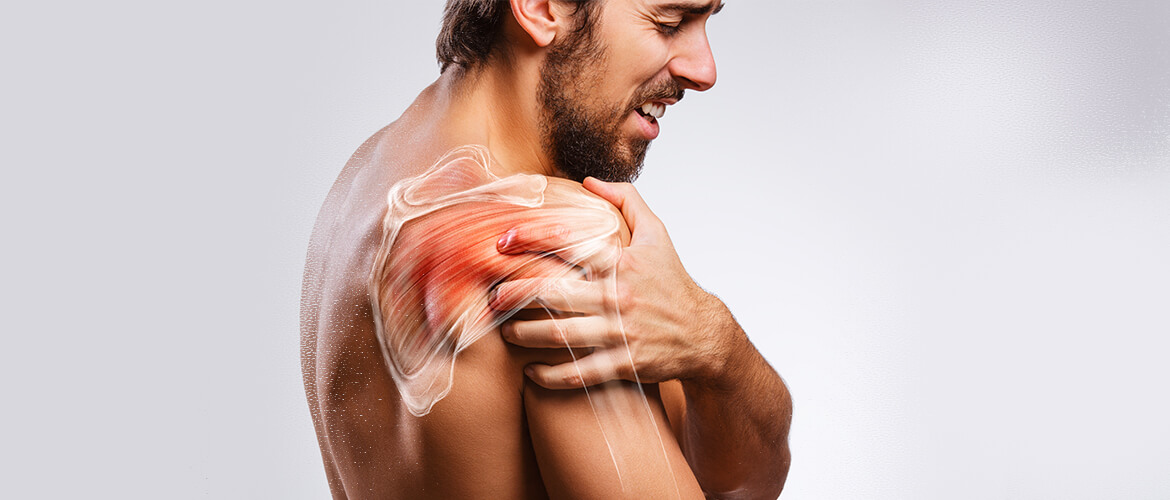People of all ages can suffer from muscle pain. Muscle pain is a symptom of some underlying health issues. The seriousness and severity of the pain vary from person to person. The pain can be experienced over the entire body or a specific area. Sometimes it becomes impossible for the person to carry out the day-to-day activities due to muscle pain.
Causes of Muscle Pain
– Injury to the muscle is one of the biggest causes of muscle pain. Any injury ignored for long enough can increase muscle pain.
– Poor posture for instance slouching while sitting and walking can lead to weak muscles, especially the back and leg muscles. Over time this can strain the muscles and cause muscle spasms and pain.
– Inflammation of the muscle gives rise to swelling and limits movement. It can hamper daily activities.
– Autoimmune diseases happen when the body’s immune system attacks the healthy cells. Autoimmune diseases that basically affect the bone can also cause muscle pain such as Lupus, Multiple sclerosis, Rheumatoid arthritis, and Ankylosing spondylitis.
– Muscle soreness caused due to exercise is commonly called Delayed Onset Muscle Soreness, or DOMS, and it is entirely normal. DOMS usually occurs within 6-8 hours after a new activity or a change. It lasts 24-48 hours after the exercise.
– Infections like viral fever and bacterial infections can cause back pain and body ache.
Here are the five best ways to treat muscle pain naturally :
1. Apply ice and heat pack
Depending upon the causes, muscle pain can be reduced with ice and heat packs or compress. An ice pack is put on a pulled muscle or a strained muscle. It reduces the swelling when the muscles are inflamed. Icing the affected area numbs and eases pain. It should be applied immediately after the injury to control the swelling. Keep it on the affected area for 10 minutes at a time and let it rest for an hour before reapplying the ice pack.
Heat Pack can be applied 48 hours after an acute injury, when the symptoms include joint and muscle stiffness, muscle cramps, and spasms. It increases the blood flow to the affected area and helps to relax the muscle. It should not be applied to a new injury or in case of infections. The heat pack should be warm enough but not too hot to cause burns. The heat pack should be applied for 10 minutes at a time.
2. Stay hydrated
Staying hydrated helps you stay healthy. Dehydration is one of the causes of painful muscles. A dehydrated body does not function properly. It is essential to drink at least 7-8 glasses of water every day. Dehydration leads to electrolyte imbalance and can worsen muscle aches. An increase in intake of water increases the body’s ability to heal and reduce the swelling and inflammation of the muscles. Include electrolyte-based drinks that replenish both lost electrolytes and water in the body.
3. Apply essential oils
Apart from heat and ice packs, essential oils can reduce muscle pain and inflammation. Swelling, pain, inflammation, and tension all over the body can be relieved with different types of oils. It has to be used appropriately as it can lead to skin irritation and increase pain. Dilution with carrier oils like coconut oil, olive oil, argan oil, and more is necessary to decrease skin irritation. Massages of essential oils can quickly ease the tension by getting through the skin and relieve pain in the targeted area. It can be put into a bath or warm and cold compress. Some of the essential oils that can be used for muscle pain are:
1. Ginger oil – It has a warming effect on the muscles and reduces pain.
2. Peppermint oil – Peppermint is well known for its cooling properties. It can be applied to relax the muscles from spasms.
3. Lavender oil – Lavender oil calms the muscles from spasms which reduces inflammation.
4. Get rest
Rest is of the utmost importance to the human body. 7-8 hours of sleep can help the body feel refreshed and rejuvenated. Muscles of the whole body work throughout the day, and resting at night can replenish the energy. Aches can hamper the ability to get a good night’s sleep. Sleep increases the rate of recovery from an injury as it helps strengthen the immune system. Posture also plays a role in leading to stiffness of the muscles. Sitting for long times in bad posture can tighten muscles leading to pain. Meditation before or after sleep can release feel-good hormones that alleviate the tension of the muscles and relax the muscles’ tension.
5. A fiber and protein-rich diet
Diet plays a significant role in one’s life. Eating junk and processed food has become the norm today. Fiber, protein, and right amount of carbs are essential to the diet. Whole grains give you a whole lot of nutrients including fiber and protein, vitamins, and iron. Nuts are a great way to add protein and magnesium to your diet. Flax seeds, hemp seeds, and chia seeds are rich in omega-3 fatty acids. These create hormones that control inflammation and help in relaxation.
However, sometimes these natural remedies are not enough to treat muscle pain. Topical fast pain relief gel and pain relief spray can come in handy during those tough times. Omnigel is available as a gel for muscle pain (also available as a spray) that provides quick relief to painful muscles almost immediately.
Get quick relief Omnigel for muscle pain and inflammation. Sold nationwide at pharmacies offline and online.

